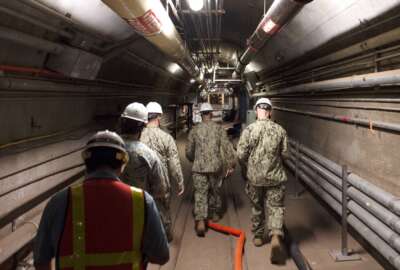Kendall cautions against giving service chiefs too large a role in acquisition
A nascent move to give the military's joint chiefs a larger role in procurement as part of the acquisition reform is expected to start taking shape on Capitol Hill.
One more takeaway from Kendall’s remarks to NDIA in this week’s notebook: This one has to do with a nascent move to give the military’s joint chiefs a larger role in procurement as part of the acquisition reform that’s expected to start taking shape on Capitol Hill this year.
No specific legislation’s been offered yet, but Sen. John McCain (R-Ariz.), the chairman of the Senate Armed Services Committee, has already said he intends to insert language in this year’s defense authorization bill to let the chiefs participate in acquisition in a “much more meaningful fashion,” and several of the chiefs have expressed support for the idea.
Kendall says he supports that — up to a point, but that it’s easy to see how things could be taken too far.
“They should not be deeply engaged on how to structure a program, what kind of contract to use or what kind of risk mitigation to use. Because when they get engaged on those things, we have big problems,” Kendall said.
He offered a handful of historical examples, including the Army’s ill-fated Future Combat Systems, which spent $159 billion before it was canceled by former Secretary Robert Gates. Kendall worked on the program at the time for an outside contractor.
“One of the important reasons FCS ended the way it did was because of an arbitrary direction from a service chief about how long it would take us to get from milestone B to production,” Kendall said. “It was utterly, totally unrealistic, and it forced us to take huge risks in order to try to realize what he said we should do. We need to be careful about what we ask the service chiefs to do. They do not have expertise in technology or program management or testing. They don’t come from those communities, and we are a professional community.”
All that said, Kendall does want the chiefs to play a greater role in some areas. He told reporters after his NDIA speech that he’d like to see the joint chiefs do more to build the uniformed acquisition workforce and make sure people in those career fields have a fair chance to be promoted, make sure senior military officials are willing and able to adjust systems’ requirements as needs arise, and help their services as a whole maintain realistic acquisition budgets — none of which, it should be noted, would necessarily require legislation.
“I need to talk to the chiefs more about this, but I think there’s a perception that they’re excluded from acquisition more than they actually are. They don’t need a statutory change to be fully engaged,” he said. “I can’t recall when I’ve had a service chief come to an acquisition board meeting, but they’re certainly welcome to come in any time. I value their advice on their programs.”
Copyright © 2025 Federal News Network. All rights reserved. This website is not intended for users located within the European Economic Area.
Jared Serbu is deputy editor of Federal News Network and reports on the Defense Department’s contracting, legislative, workforce and IT issues.
Follow @jserbuWFED






